The Japanese love their corn potage (corn soup) both hot and chilled! While this easy recipe is delicious made with fresh sweet corn, you can also use frozen or canned corn. The creamy and smooth soup will comfort you on those cool late summer evenings!
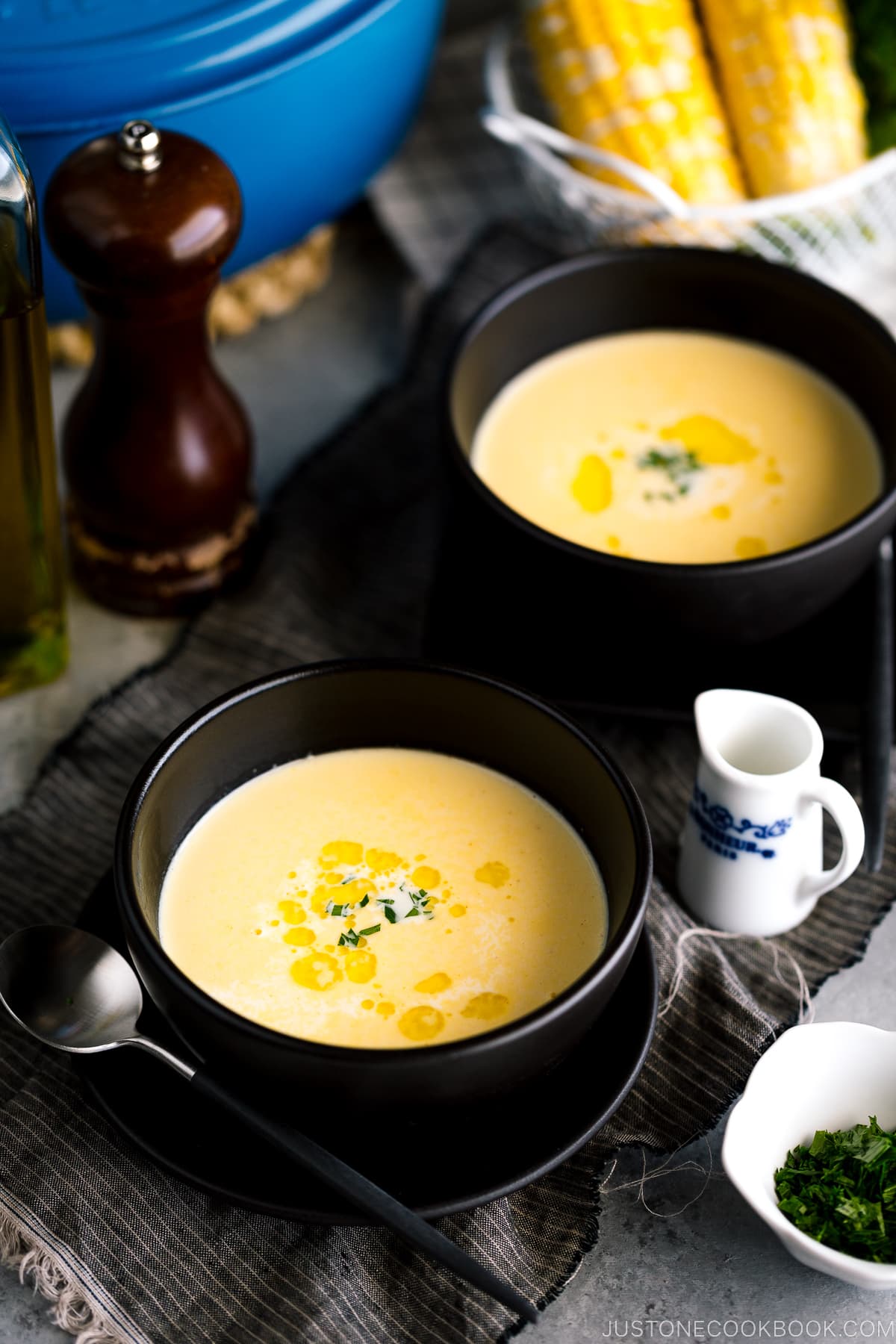
One of our family’s favorites, sweet corn, is in season from June to October. While we spent the summer in Japan, I received a lot of recipe requests for Corn Soup and Japanese Corn Soup. As soon as I returned, I quickly refined my original recipe so I could share this late, late-summer soup with you.
As the nights are starting to make a subtle shift with a touch of cool air, this Japanese Corn Potage or Corn Soup would be the coziest way to savor the deliciousness of the last of the season’s produce.
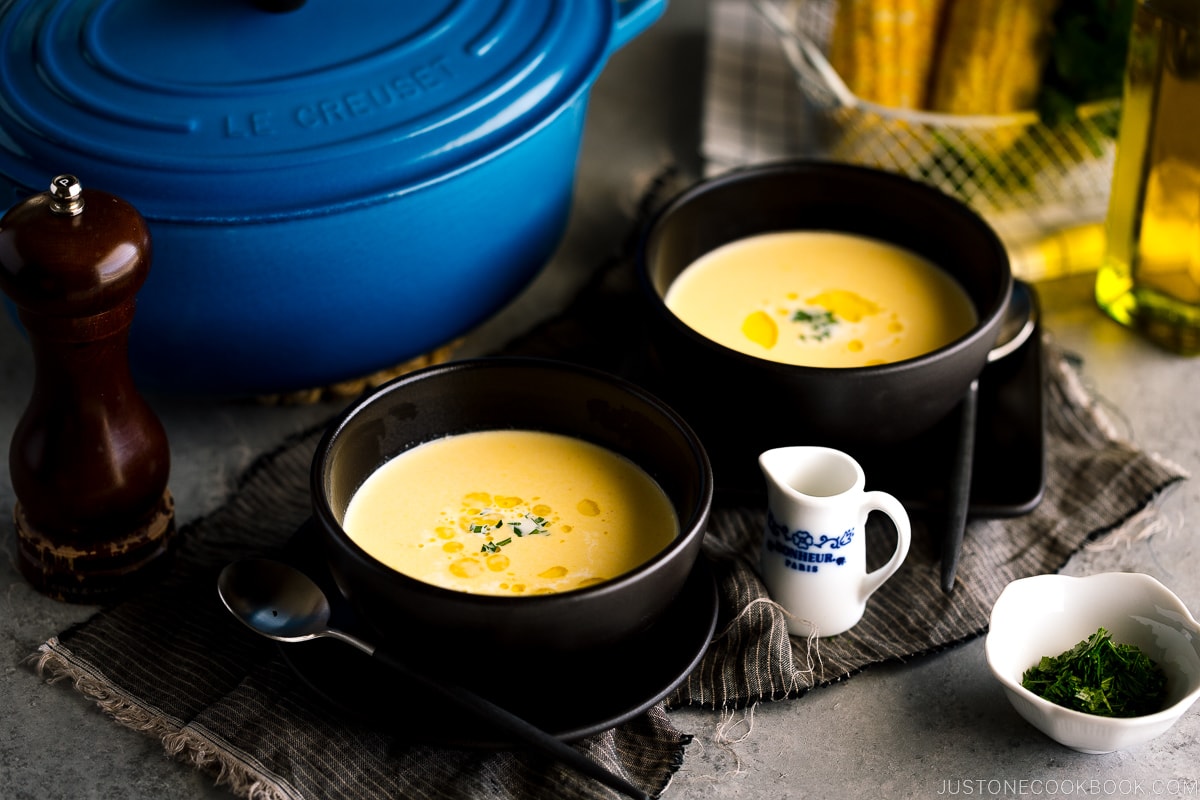
What is Corn Potage (Japanese Corn Soup)?
Potage refers to thick soups, stews, or porridges that originated in the medieval cuisine of northern France. Despite being a Western-style soup, there is no Western recipe for corn potage on the internet. Instead, you will find Japanese corn potage recipes.
In Japan, where most soups are variations of miso soup, you will find a few non-Japanese soups that are just as popular. Corn potage or corn soup is one of them, along with clam chowder, minestrone, borscht, and Chinese-style soups (chuka soup 中華スープ).
So, what is corn potage? It’s a super creamy corn soup made with fresh, canned, or frozen corn, onion, milk, and heavy cream. It’s ridiculously simple to make.
This creamy corn soup is called “potage,” where the corn kernels and soup are blended till smooth and strained through a fine mesh sieve. As a result, the soup has no fibers and the texture is silky smooth and creamy with a somewhat thick consistency.
When the soup is not blended and still has chunky bits of corn, we usually refer to it as corn soup. However, some people might call the creamy corn potage with a thick consistency “corn soup” as well, so it can be a little confusing.
Both corn potage and corn soup are especially popular among children because Okosama Lunch (children’s menu) often includes corn potage or soup as part of the kid’s meal next to Ebi Fry and Bite. Many of us grew up drinking corn potage, and there is a nostalgic feeling attached to this soup for the Japanese.
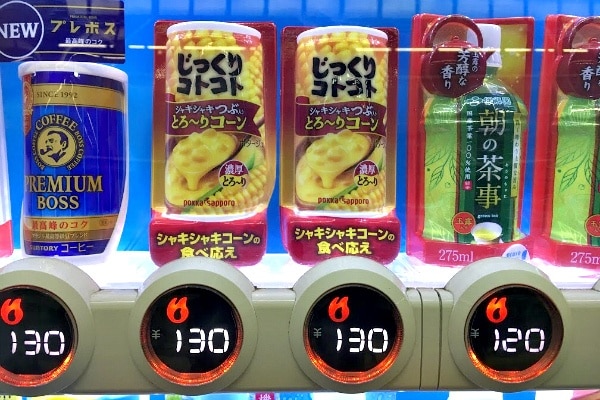
If you’re in Japan, you can even get corn potage from the vending machine!
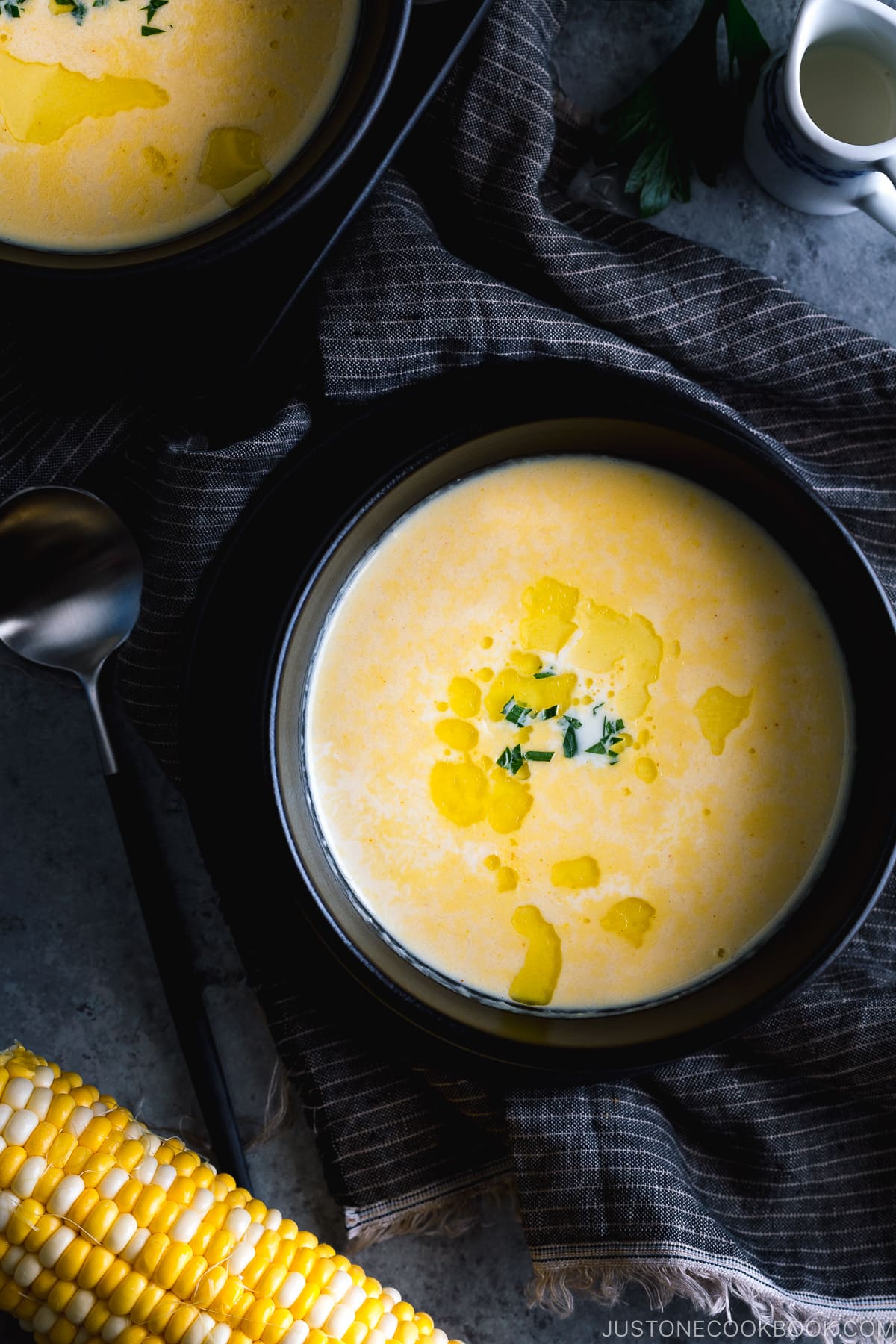
3 Tips to Make Delicious Corn Potage (Japanese Corn Soup)
Tip 1 – Cook the cobs together in the soup
If you’re using fresh corn on the cob to make this recipe, do not discard the cobs! Add them to the soup while cooking as they release delicious flavors and sweetness into the soup.
Tip 2 – Use water for the soup
If you prefer a strong corn flavor in your soup, I highly recommend using water to maximize the corn flavor from the corn kernels.
Some other recipes for corn soup/corn potage recommend using vegetable or chicken broth or bouillon. I’ve tried them, but as a purist, I stick to using ONLY water to extract the sweet corn flavor for a pure, undiluted taste.
Tip 3 – Adjust the ratio of creaminess with milk and heavy cream
Most of us prefer rich and creamy soup, but not everyone can afford the extra calories from heavy cream. It’s entirely up to you how much heavy cream you want to add to this recipe. Feel free to adjust the ratio of heavy cream and milk for the 2 cups you add to the soup.
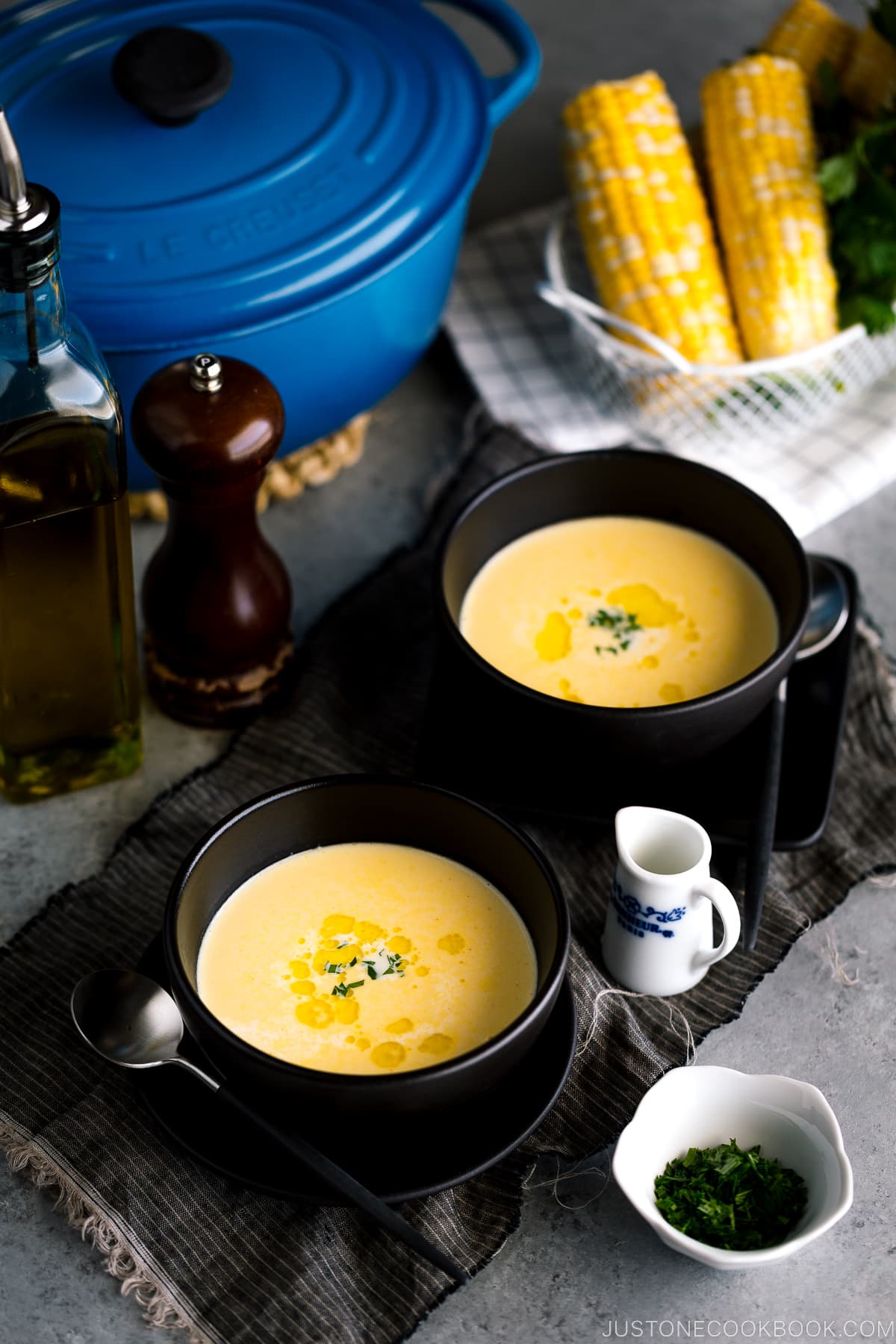
Which Do You Prefer: Corn Soup or Corn Potage?
When it comes to texture, you can choose to blend the corn kernels and strain, blend but not strain, or keep the corn kernels as they are. It’s really a personal preference.
For those who have tried corn potage in Japan and love it, I’m sure you would prefer following today’s method.
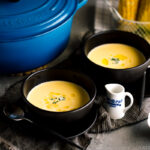
Prevent your screen from going dark
To Prepare the Corn
-
Slice off the corn kernels from 4 ears sweet corn.
-
Place the corn kernels on a rimmed baking sheet, saving the cobs for later.
-
Add 1 Tbsp extra virgin olive oila sprinkle of kosher saltand ¼ tsp paprika.
-
Mix all together with your hands and spread it out evenly in a single layer. Roast the corn kernels at 450ºF (230ºC) degrees for 15 minutes. Once it‘s done, remove it from the oven and set it aside.
To Prepare the Soup
-
Meanwhile, thinly slice ½ onion against the grain. Heat 1½ Tbsp unsalted butter in a heavy-bottomed pot.
-
Add the sliced onion and a pinch of kosher salt. Sauté until translucent.
-
Add the roasted kernels and 3 cups water.
-
Add the reserved cobs to the pot to naturally sweeten the soup. Push the cobs down to check if they are completely covered by the liquid; if not, add more water until submerged.
-
Bring to a boil over medium heat. Cover and lower the heat to medium-low heat and simmer for 15 minutes. During this time, skim the foam on the surface for a more refined taste. After 15 minutes, discard the cobs.
-
Using an immersion blender, blend the soup until creamy and smooth. If you use a food processor or blender, let the soup cool for a few minutes before blending to avoid major splashes and cover the opening with a towel.
-
If you want to make your soup similar to corn potage (Japanese corn soup), strain the soup through a fine-mesh sieve for a smoother consistency.
-
Transfer the soup back to the pot. Add 1 cup heavy (whipping) cream and 1 cup milk. The ratio is entirely up to you. Here, I used equal parts milk and heavy cream, 1 cup each. Bring back to a simmer and cook, uncovered, for 10 minutes or more, stirring frequently. Once the water evaporates, it’ll be more flavorful.
-
Season with kosher salt and freshly ground black pepper. Make sure to taste the soup when you season. Finely chop 1 sprig parsley. Serve the soup hot or chilled. You can drizzle 1 Tbsp extra virgin olive oil and/or 1 Tbsp heavy (whipping) cream among the bowls and sprinkle the parsley to garnish.
Calories: 446 kcal · Carbohydrates: 25 g · Protein: 6 g · Fat: 38 g · Saturated Fat: 20 g · Polyunsaturated Fat: 2 g · Monounsaturated Fat: 14 g · Trans Fat: 1 g · Cholesterol: 104 mg · Sodium: 894 mg · Potassium: 348 mg · Fiber: 2 g · Sugar: 8 g · Vitamin A: 1477 IU · Vitamin C: 7 mg · Calcium: 143 mg · Iron: 1 mg
©JustOneCookbook.com Content and photographs are copyright protected. Sharing of this recipe is both encouraged and appreciated. Copying and/or pasting full recipes to any website or social media is strictly prohibited. Please view my photo use policy here.
Editor’s Note: This post was originally published on September 18, 2017. It was republished with more information on July 29, 2024.

